University Management Module: Self-Reflection and SWOT Analysis Report
VerifiedAdded on 2022/09/11
|10
|2164
|17
Report
AI Summary
This report presents a comprehensive self-reflection on the student's managerial capabilities, focusing on the skills necessary for effective management. It begins with an introduction to the self-reflection technique and its importance in professional development, referencing the application of SWOT analysis. The discussion section delves into the key responsibilities of a manager, including cost control, revenue generation, and efficient alignment of business actions. The report then analyzes the student's strengths, particularly in analytical decision-making, supported by relevant literature. Weaknesses in team management are also identified, along with opportunities for creative thinking and visionary leadership. The report concludes with a professional development plan outlining specific objectives, activities, and timeframes for improving creative thinking, problem-solving, and team management skills. References from various authors are included to support the analysis and findings of the self-reflection.
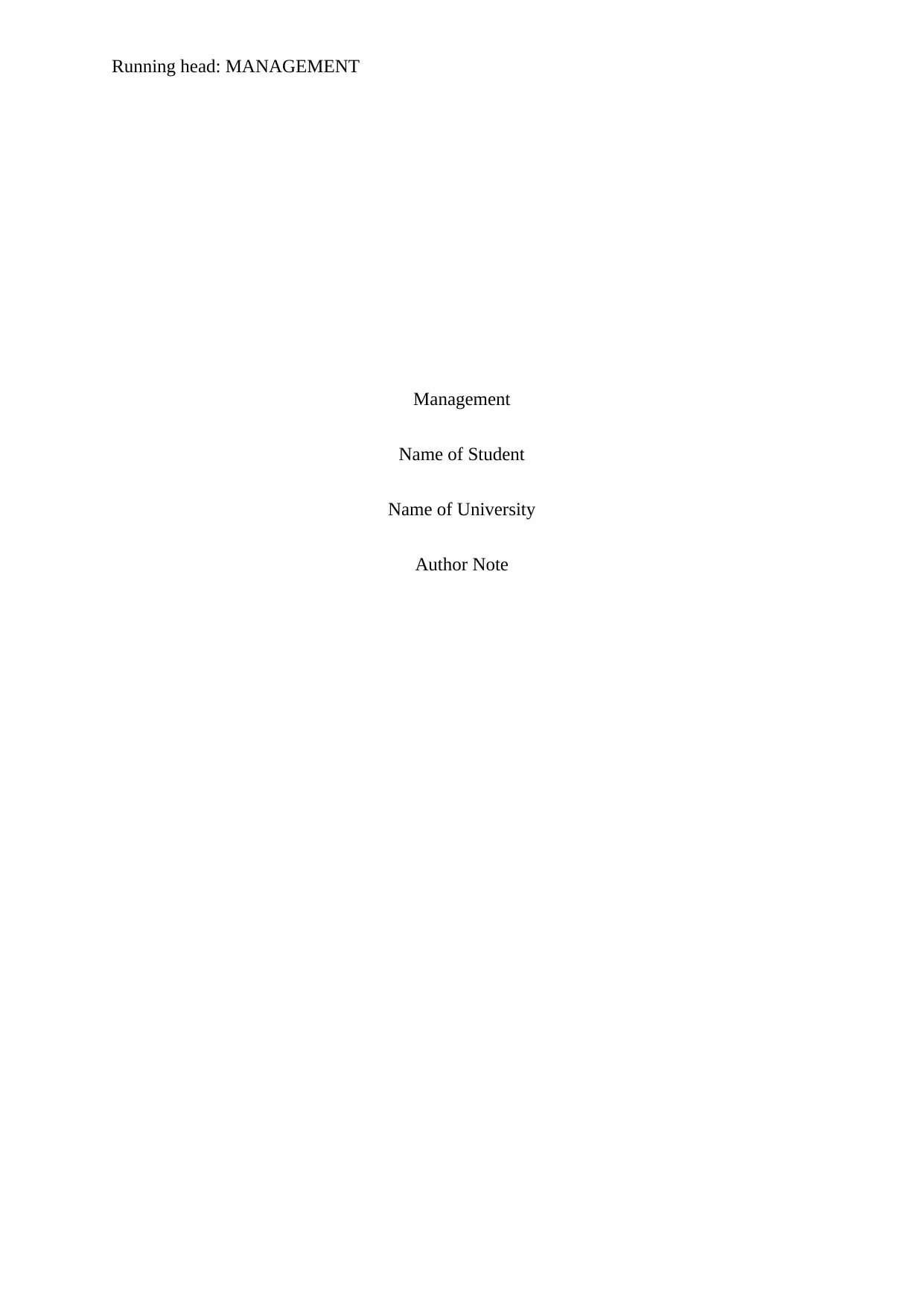
Running head: MANAGEMENT
Management
Name of Student
Name of University
Author Note
Management
Name of Student
Name of University
Author Note
Paraphrase This Document
Need a fresh take? Get an instant paraphrase of this document with our AI Paraphraser
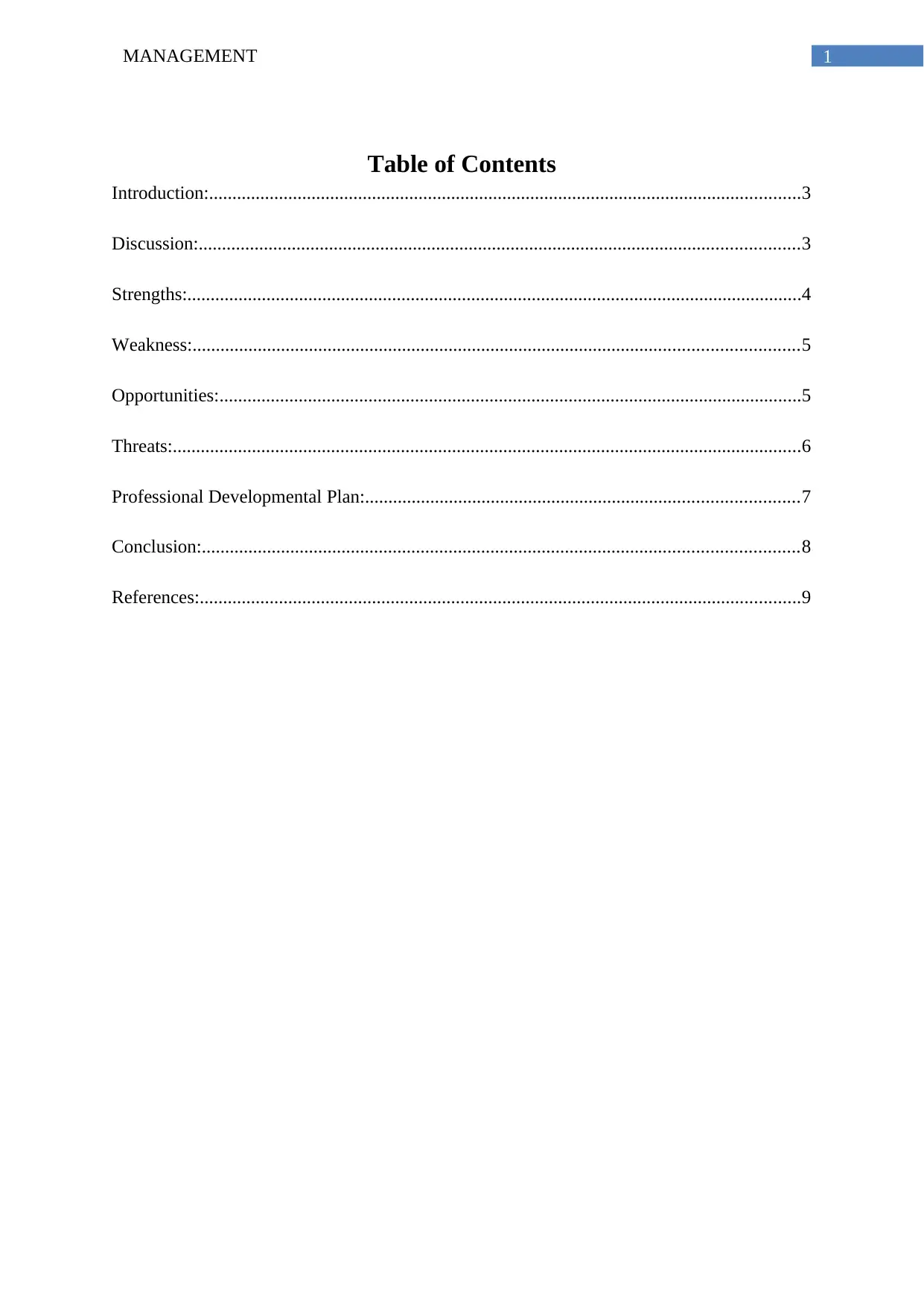
1MANAGEMENT
Table of Contents
Introduction:...............................................................................................................................3
Discussion:.................................................................................................................................3
Strengths:....................................................................................................................................4
Weakness:..................................................................................................................................5
Opportunities:.............................................................................................................................5
Threats:.......................................................................................................................................6
Professional Developmental Plan:.............................................................................................7
Conclusion:................................................................................................................................8
References:.................................................................................................................................9
Table of Contents
Introduction:...............................................................................................................................3
Discussion:.................................................................................................................................3
Strengths:....................................................................................................................................4
Weakness:..................................................................................................................................5
Opportunities:.............................................................................................................................5
Threats:.......................................................................................................................................6
Professional Developmental Plan:.............................................................................................7
Conclusion:................................................................................................................................8
References:.................................................................................................................................9
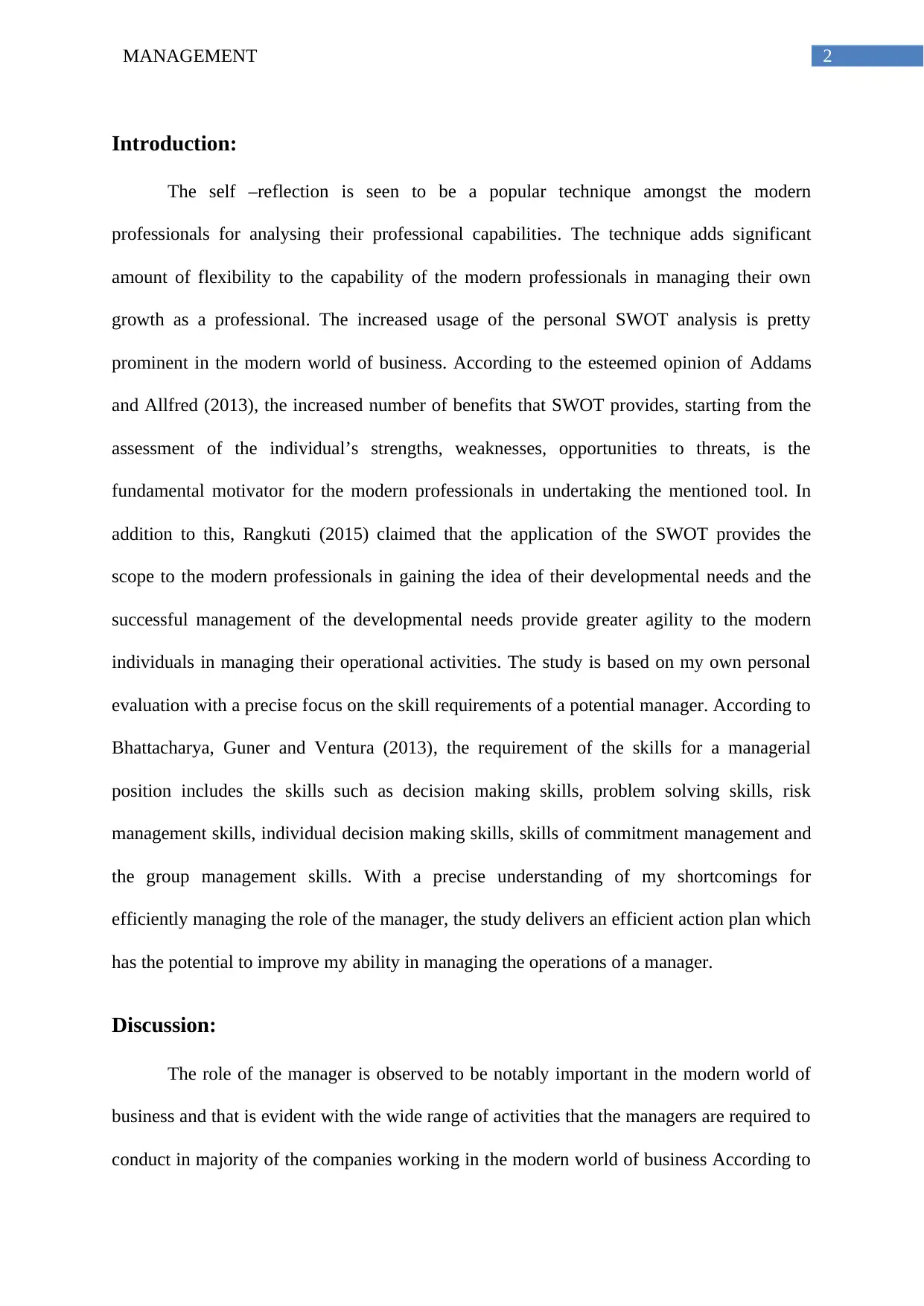
2MANAGEMENT
Introduction:
The self –reflection is seen to be a popular technique amongst the modern
professionals for analysing their professional capabilities. The technique adds significant
amount of flexibility to the capability of the modern professionals in managing their own
growth as a professional. The increased usage of the personal SWOT analysis is pretty
prominent in the modern world of business. According to the esteemed opinion of Addams
and Allfred (2013), the increased number of benefits that SWOT provides, starting from the
assessment of the individual’s strengths, weaknesses, opportunities to threats, is the
fundamental motivator for the modern professionals in undertaking the mentioned tool. In
addition to this, Rangkuti (2015) claimed that the application of the SWOT provides the
scope to the modern professionals in gaining the idea of their developmental needs and the
successful management of the developmental needs provide greater agility to the modern
individuals in managing their operational activities. The study is based on my own personal
evaluation with a precise focus on the skill requirements of a potential manager. According to
Bhattacharya, Guner and Ventura (2013), the requirement of the skills for a managerial
position includes the skills such as decision making skills, problem solving skills, risk
management skills, individual decision making skills, skills of commitment management and
the group management skills. With a precise understanding of my shortcomings for
efficiently managing the role of the manager, the study delivers an efficient action plan which
has the potential to improve my ability in managing the operations of a manager.
Discussion:
The role of the manager is observed to be notably important in the modern world of
business and that is evident with the wide range of activities that the managers are required to
conduct in majority of the companies working in the modern world of business According to
Introduction:
The self –reflection is seen to be a popular technique amongst the modern
professionals for analysing their professional capabilities. The technique adds significant
amount of flexibility to the capability of the modern professionals in managing their own
growth as a professional. The increased usage of the personal SWOT analysis is pretty
prominent in the modern world of business. According to the esteemed opinion of Addams
and Allfred (2013), the increased number of benefits that SWOT provides, starting from the
assessment of the individual’s strengths, weaknesses, opportunities to threats, is the
fundamental motivator for the modern professionals in undertaking the mentioned tool. In
addition to this, Rangkuti (2015) claimed that the application of the SWOT provides the
scope to the modern professionals in gaining the idea of their developmental needs and the
successful management of the developmental needs provide greater agility to the modern
individuals in managing their operational activities. The study is based on my own personal
evaluation with a precise focus on the skill requirements of a potential manager. According to
Bhattacharya, Guner and Ventura (2013), the requirement of the skills for a managerial
position includes the skills such as decision making skills, problem solving skills, risk
management skills, individual decision making skills, skills of commitment management and
the group management skills. With a precise understanding of my shortcomings for
efficiently managing the role of the manager, the study delivers an efficient action plan which
has the potential to improve my ability in managing the operations of a manager.
Discussion:
The role of the manager is observed to be notably important in the modern world of
business and that is evident with the wide range of activities that the managers are required to
conduct in majority of the companies working in the modern world of business According to
⊘ This is a preview!⊘
Do you want full access?
Subscribe today to unlock all pages.

Trusted by 1+ million students worldwide
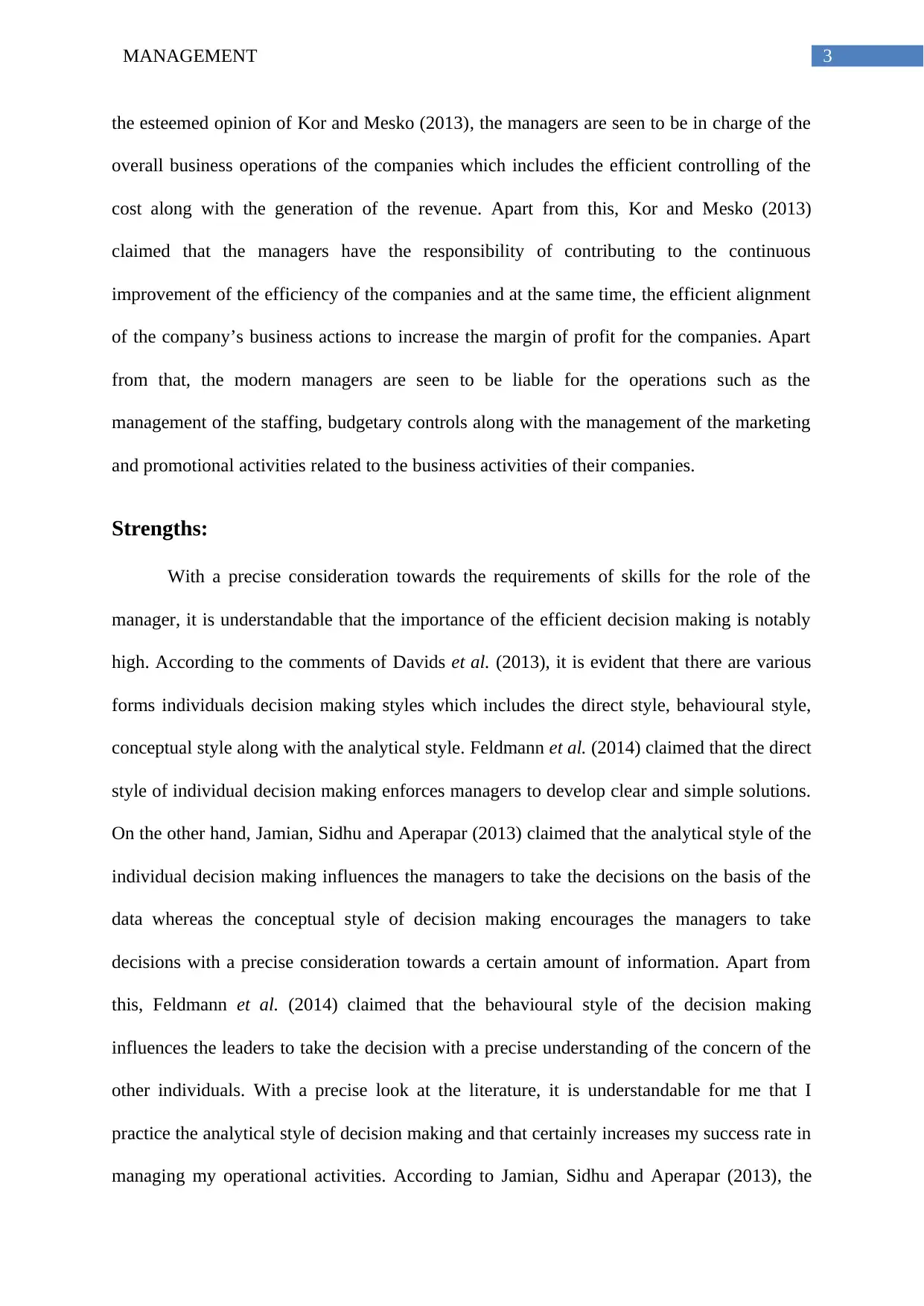
3MANAGEMENT
the esteemed opinion of Kor and Mesko (2013), the managers are seen to be in charge of the
overall business operations of the companies which includes the efficient controlling of the
cost along with the generation of the revenue. Apart from this, Kor and Mesko (2013)
claimed that the managers have the responsibility of contributing to the continuous
improvement of the efficiency of the companies and at the same time, the efficient alignment
of the company’s business actions to increase the margin of profit for the companies. Apart
from that, the modern managers are seen to be liable for the operations such as the
management of the staffing, budgetary controls along with the management of the marketing
and promotional activities related to the business activities of their companies.
Strengths:
With a precise consideration towards the requirements of skills for the role of the
manager, it is understandable that the importance of the efficient decision making is notably
high. According to the comments of Davids et al. (2013), it is evident that there are various
forms individuals decision making styles which includes the direct style, behavioural style,
conceptual style along with the analytical style. Feldmann et al. (2014) claimed that the direct
style of individual decision making enforces managers to develop clear and simple solutions.
On the other hand, Jamian, Sidhu and Aperapar (2013) claimed that the analytical style of the
individual decision making influences the managers to take the decisions on the basis of the
data whereas the conceptual style of decision making encourages the managers to take
decisions with a precise consideration towards a certain amount of information. Apart from
this, Feldmann et al. (2014) claimed that the behavioural style of the decision making
influences the leaders to take the decision with a precise understanding of the concern of the
other individuals. With a precise look at the literature, it is understandable for me that I
practice the analytical style of decision making and that certainly increases my success rate in
managing my operational activities. According to Jamian, Sidhu and Aperapar (2013), the
the esteemed opinion of Kor and Mesko (2013), the managers are seen to be in charge of the
overall business operations of the companies which includes the efficient controlling of the
cost along with the generation of the revenue. Apart from this, Kor and Mesko (2013)
claimed that the managers have the responsibility of contributing to the continuous
improvement of the efficiency of the companies and at the same time, the efficient alignment
of the company’s business actions to increase the margin of profit for the companies. Apart
from that, the modern managers are seen to be liable for the operations such as the
management of the staffing, budgetary controls along with the management of the marketing
and promotional activities related to the business activities of their companies.
Strengths:
With a precise consideration towards the requirements of skills for the role of the
manager, it is understandable that the importance of the efficient decision making is notably
high. According to the comments of Davids et al. (2013), it is evident that there are various
forms individuals decision making styles which includes the direct style, behavioural style,
conceptual style along with the analytical style. Feldmann et al. (2014) claimed that the direct
style of individual decision making enforces managers to develop clear and simple solutions.
On the other hand, Jamian, Sidhu and Aperapar (2013) claimed that the analytical style of the
individual decision making influences the managers to take the decisions on the basis of the
data whereas the conceptual style of decision making encourages the managers to take
decisions with a precise consideration towards a certain amount of information. Apart from
this, Feldmann et al. (2014) claimed that the behavioural style of the decision making
influences the leaders to take the decision with a precise understanding of the concern of the
other individuals. With a precise look at the literature, it is understandable for me that I
practice the analytical style of decision making and that certainly increases my success rate in
managing my operational activities. According to Jamian, Sidhu and Aperapar (2013), the
Paraphrase This Document
Need a fresh take? Get an instant paraphrase of this document with our AI Paraphraser
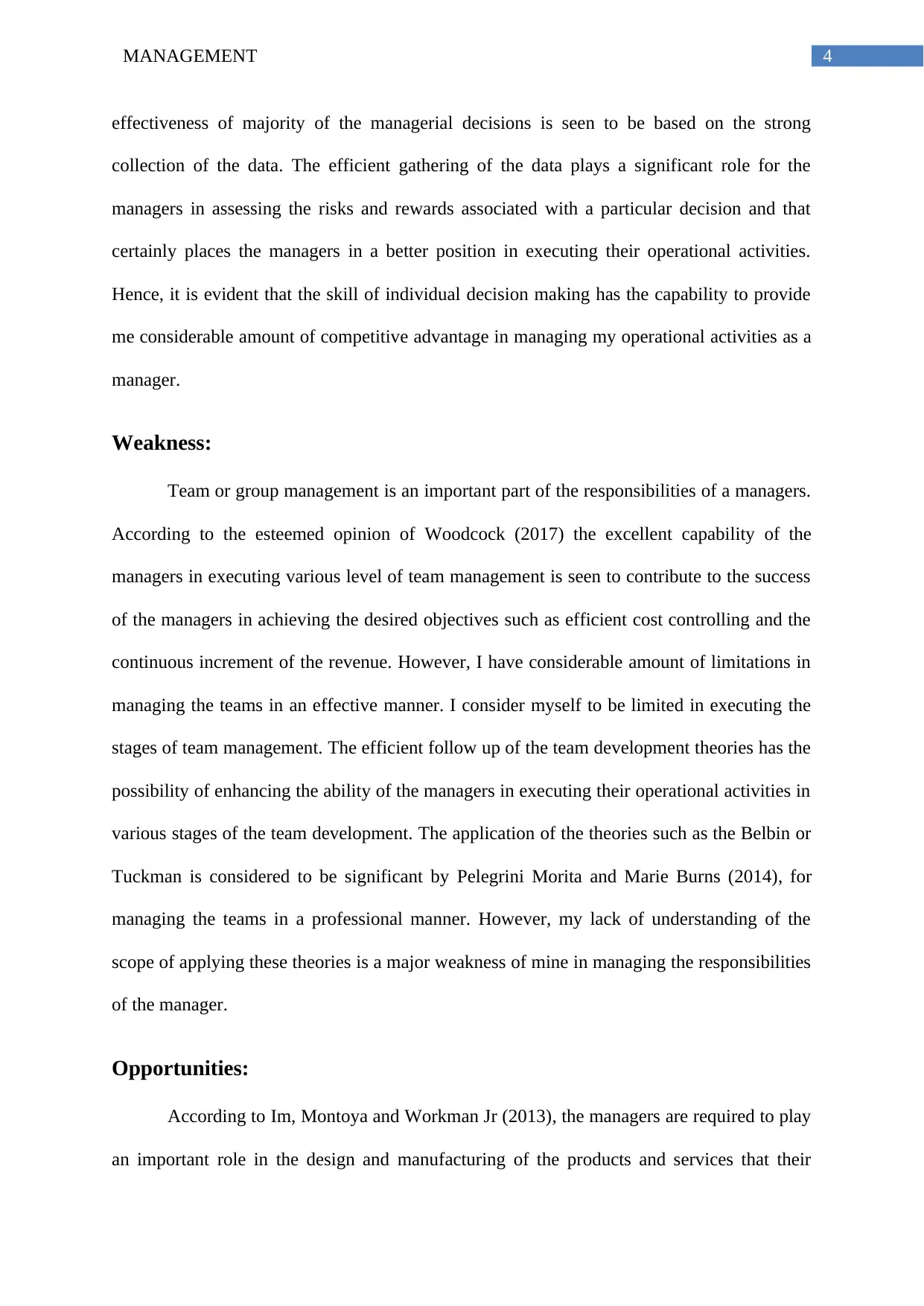
4MANAGEMENT
effectiveness of majority of the managerial decisions is seen to be based on the strong
collection of the data. The efficient gathering of the data plays a significant role for the
managers in assessing the risks and rewards associated with a particular decision and that
certainly places the managers in a better position in executing their operational activities.
Hence, it is evident that the skill of individual decision making has the capability to provide
me considerable amount of competitive advantage in managing my operational activities as a
manager.
Weakness:
Team or group management is an important part of the responsibilities of a managers.
According to the esteemed opinion of Woodcock (2017) the excellent capability of the
managers in executing various level of team management is seen to contribute to the success
of the managers in achieving the desired objectives such as efficient cost controlling and the
continuous increment of the revenue. However, I have considerable amount of limitations in
managing the teams in an effective manner. I consider myself to be limited in executing the
stages of team management. The efficient follow up of the team development theories has the
possibility of enhancing the ability of the managers in executing their operational activities in
various stages of the team development. The application of the theories such as the Belbin or
Tuckman is considered to be significant by Pelegrini Morita and Marie Burns (2014), for
managing the teams in a professional manner. However, my lack of understanding of the
scope of applying these theories is a major weakness of mine in managing the responsibilities
of the manager.
Opportunities:
According to Im, Montoya and Workman Jr (2013), the managers are required to play
an important role in the design and manufacturing of the products and services that their
effectiveness of majority of the managerial decisions is seen to be based on the strong
collection of the data. The efficient gathering of the data plays a significant role for the
managers in assessing the risks and rewards associated with a particular decision and that
certainly places the managers in a better position in executing their operational activities.
Hence, it is evident that the skill of individual decision making has the capability to provide
me considerable amount of competitive advantage in managing my operational activities as a
manager.
Weakness:
Team or group management is an important part of the responsibilities of a managers.
According to the esteemed opinion of Woodcock (2017) the excellent capability of the
managers in executing various level of team management is seen to contribute to the success
of the managers in achieving the desired objectives such as efficient cost controlling and the
continuous increment of the revenue. However, I have considerable amount of limitations in
managing the teams in an effective manner. I consider myself to be limited in executing the
stages of team management. The efficient follow up of the team development theories has the
possibility of enhancing the ability of the managers in executing their operational activities in
various stages of the team development. The application of the theories such as the Belbin or
Tuckman is considered to be significant by Pelegrini Morita and Marie Burns (2014), for
managing the teams in a professional manner. However, my lack of understanding of the
scope of applying these theories is a major weakness of mine in managing the responsibilities
of the manager.
Opportunities:
According to Im, Montoya and Workman Jr (2013), the managers are required to play
an important role in the design and manufacturing of the products and services that their
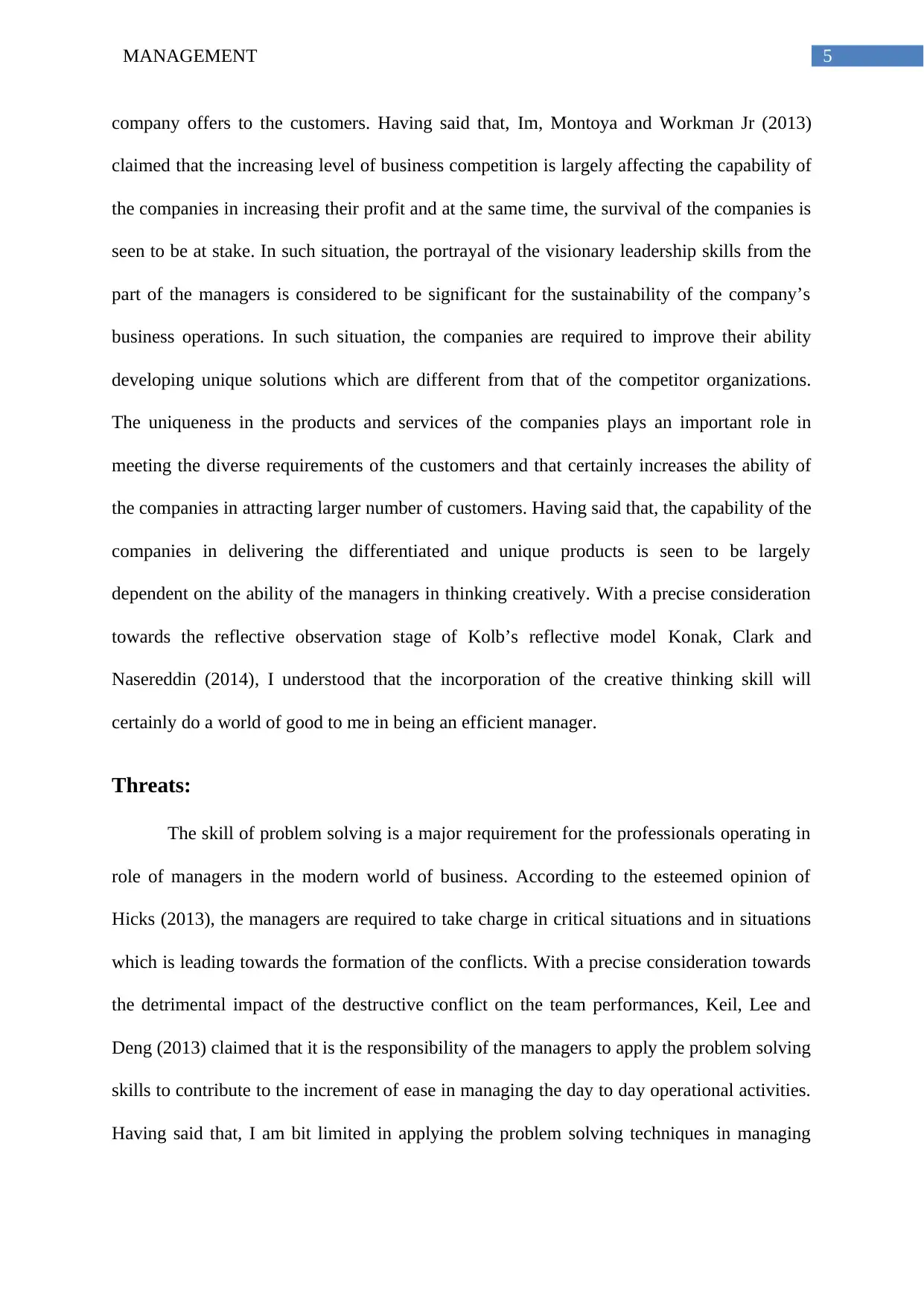
5MANAGEMENT
company offers to the customers. Having said that, Im, Montoya and Workman Jr (2013)
claimed that the increasing level of business competition is largely affecting the capability of
the companies in increasing their profit and at the same time, the survival of the companies is
seen to be at stake. In such situation, the portrayal of the visionary leadership skills from the
part of the managers is considered to be significant for the sustainability of the company’s
business operations. In such situation, the companies are required to improve their ability
developing unique solutions which are different from that of the competitor organizations.
The uniqueness in the products and services of the companies plays an important role in
meeting the diverse requirements of the customers and that certainly increases the ability of
the companies in attracting larger number of customers. Having said that, the capability of the
companies in delivering the differentiated and unique products is seen to be largely
dependent on the ability of the managers in thinking creatively. With a precise consideration
towards the reflective observation stage of Kolb’s reflective model Konak, Clark and
Nasereddin (2014), I understood that the incorporation of the creative thinking skill will
certainly do a world of good to me in being an efficient manager.
Threats:
The skill of problem solving is a major requirement for the professionals operating in
role of managers in the modern world of business. According to the esteemed opinion of
Hicks (2013), the managers are required to take charge in critical situations and in situations
which is leading towards the formation of the conflicts. With a precise consideration towards
the detrimental impact of the destructive conflict on the team performances, Keil, Lee and
Deng (2013) claimed that it is the responsibility of the managers to apply the problem solving
skills to contribute to the increment of ease in managing the day to day operational activities.
Having said that, I am bit limited in applying the problem solving techniques in managing
company offers to the customers. Having said that, Im, Montoya and Workman Jr (2013)
claimed that the increasing level of business competition is largely affecting the capability of
the companies in increasing their profit and at the same time, the survival of the companies is
seen to be at stake. In such situation, the portrayal of the visionary leadership skills from the
part of the managers is considered to be significant for the sustainability of the company’s
business operations. In such situation, the companies are required to improve their ability
developing unique solutions which are different from that of the competitor organizations.
The uniqueness in the products and services of the companies plays an important role in
meeting the diverse requirements of the customers and that certainly increases the ability of
the companies in attracting larger number of customers. Having said that, the capability of the
companies in delivering the differentiated and unique products is seen to be largely
dependent on the ability of the managers in thinking creatively. With a precise consideration
towards the reflective observation stage of Kolb’s reflective model Konak, Clark and
Nasereddin (2014), I understood that the incorporation of the creative thinking skill will
certainly do a world of good to me in being an efficient manager.
Threats:
The skill of problem solving is a major requirement for the professionals operating in
role of managers in the modern world of business. According to the esteemed opinion of
Hicks (2013), the managers are required to take charge in critical situations and in situations
which is leading towards the formation of the conflicts. With a precise consideration towards
the detrimental impact of the destructive conflict on the team performances, Keil, Lee and
Deng (2013) claimed that it is the responsibility of the managers to apply the problem solving
skills to contribute to the increment of ease in managing the day to day operational activities.
Having said that, I am bit limited in applying the problem solving techniques in managing
⊘ This is a preview!⊘
Do you want full access?
Subscribe today to unlock all pages.

Trusted by 1+ million students worldwide
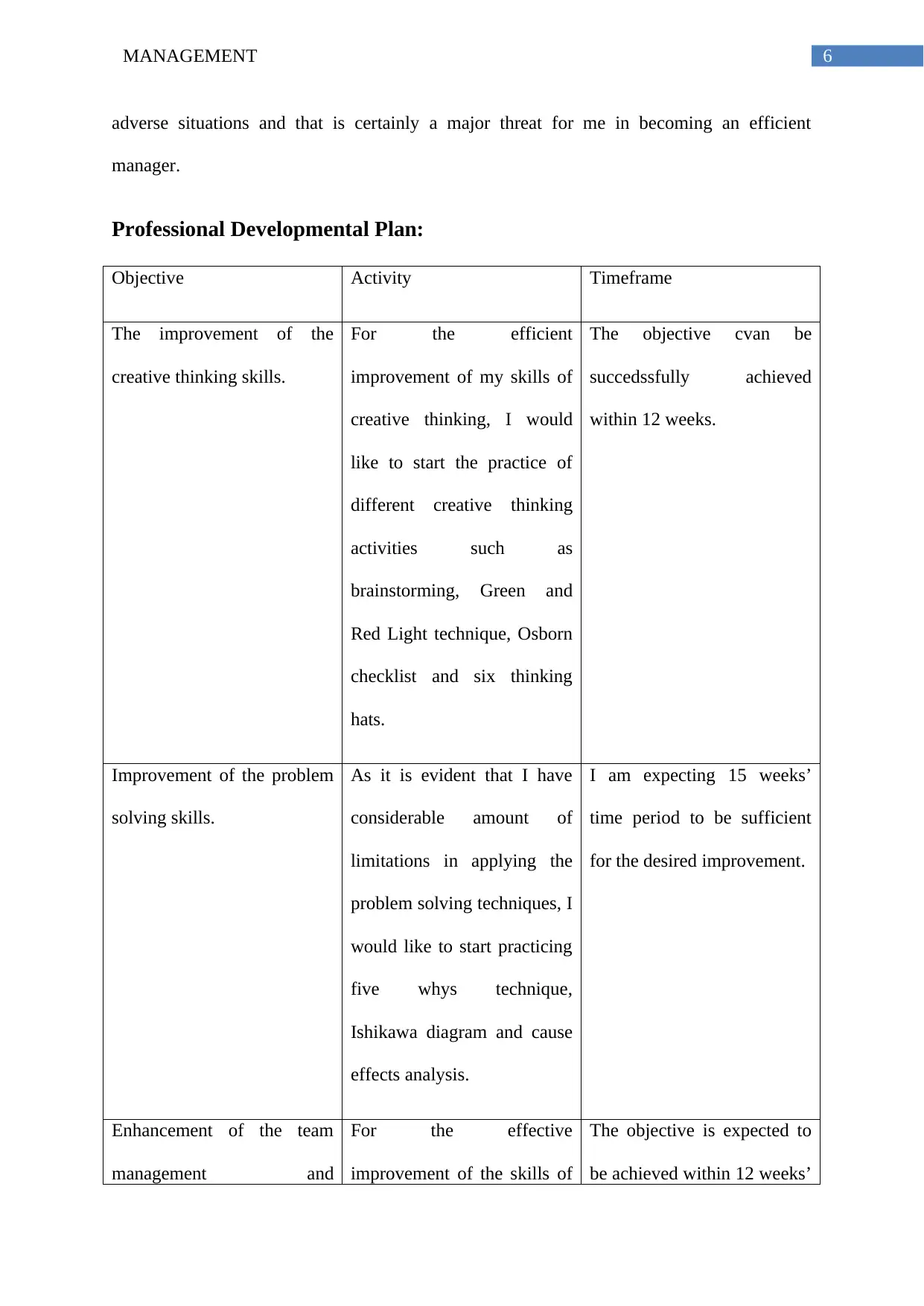
6MANAGEMENT
adverse situations and that is certainly a major threat for me in becoming an efficient
manager.
Professional Developmental Plan:
Objective Activity Timeframe
The improvement of the
creative thinking skills.
For the efficient
improvement of my skills of
creative thinking, I would
like to start the practice of
different creative thinking
activities such as
brainstorming, Green and
Red Light technique, Osborn
checklist and six thinking
hats.
The objective cvan be
succedssfully achieved
within 12 weeks.
Improvement of the problem
solving skills.
As it is evident that I have
considerable amount of
limitations in applying the
problem solving techniques, I
would like to start practicing
five whys technique,
Ishikawa diagram and cause
effects analysis.
I am expecting 15 weeks’
time period to be sufficient
for the desired improvement.
Enhancement of the team
management and
For the effective
improvement of the skills of
The objective is expected to
be achieved within 12 weeks’
adverse situations and that is certainly a major threat for me in becoming an efficient
manager.
Professional Developmental Plan:
Objective Activity Timeframe
The improvement of the
creative thinking skills.
For the efficient
improvement of my skills of
creative thinking, I would
like to start the practice of
different creative thinking
activities such as
brainstorming, Green and
Red Light technique, Osborn
checklist and six thinking
hats.
The objective cvan be
succedssfully achieved
within 12 weeks.
Improvement of the problem
solving skills.
As it is evident that I have
considerable amount of
limitations in applying the
problem solving techniques, I
would like to start practicing
five whys technique,
Ishikawa diagram and cause
effects analysis.
I am expecting 15 weeks’
time period to be sufficient
for the desired improvement.
Enhancement of the team
management and
For the effective
improvement of the skills of
The objective is expected to
be achieved within 12 weeks’
Paraphrase This Document
Need a fresh take? Get an instant paraphrase of this document with our AI Paraphraser
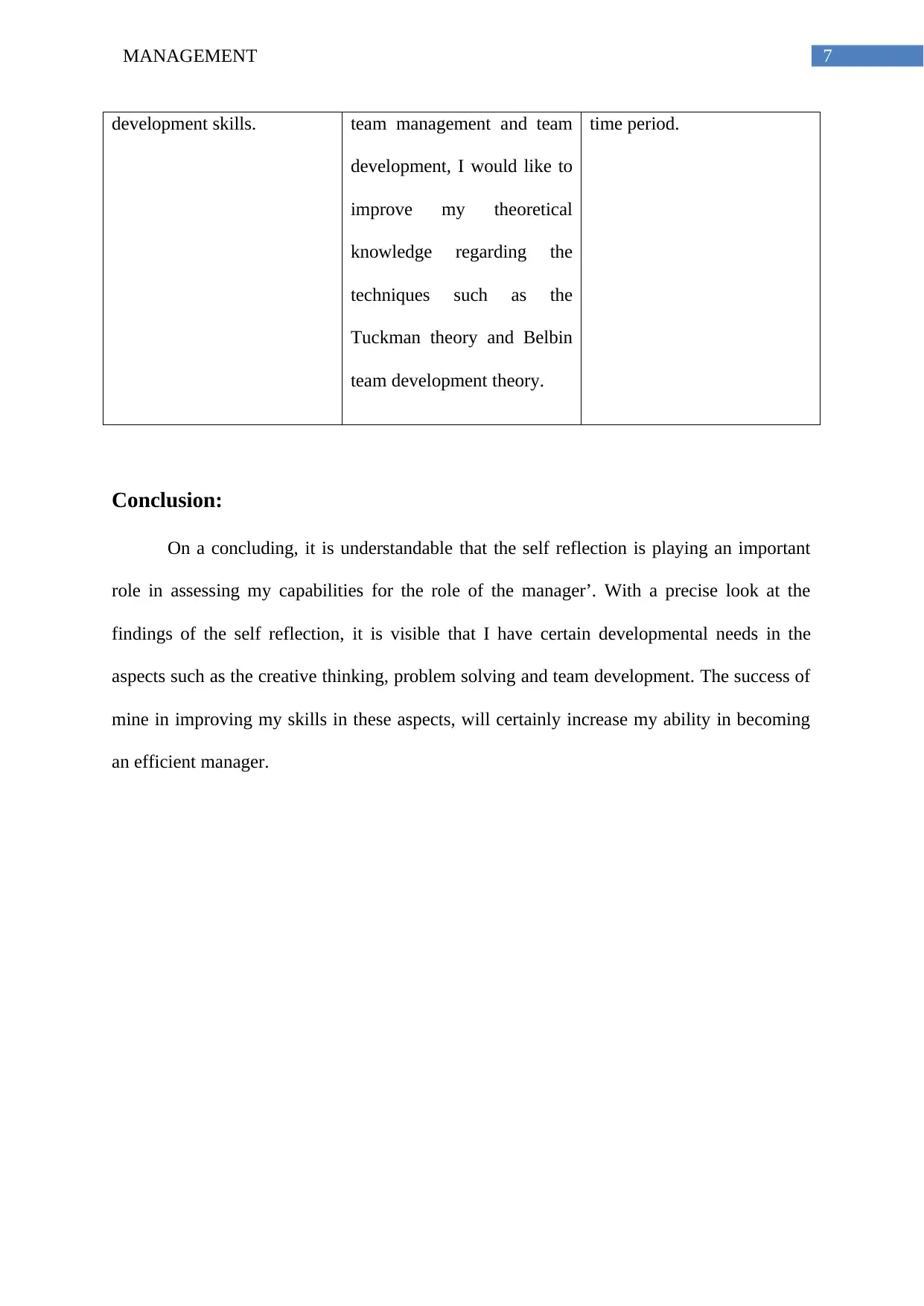
7MANAGEMENT
development skills. team management and team
development, I would like to
improve my theoretical
knowledge regarding the
techniques such as the
Tuckman theory and Belbin
team development theory.
time period.
Conclusion:
On a concluding, it is understandable that the self reflection is playing an important
role in assessing my capabilities for the role of the manager’. With a precise look at the
findings of the self reflection, it is visible that I have certain developmental needs in the
aspects such as the creative thinking, problem solving and team development. The success of
mine in improving my skills in these aspects, will certainly increase my ability in becoming
an efficient manager.
development skills. team management and team
development, I would like to
improve my theoretical
knowledge regarding the
techniques such as the
Tuckman theory and Belbin
team development theory.
time period.
Conclusion:
On a concluding, it is understandable that the self reflection is playing an important
role in assessing my capabilities for the role of the manager’. With a precise look at the
findings of the self reflection, it is visible that I have certain developmental needs in the
aspects such as the creative thinking, problem solving and team development. The success of
mine in improving my skills in these aspects, will certainly increase my ability in becoming
an efficient manager.
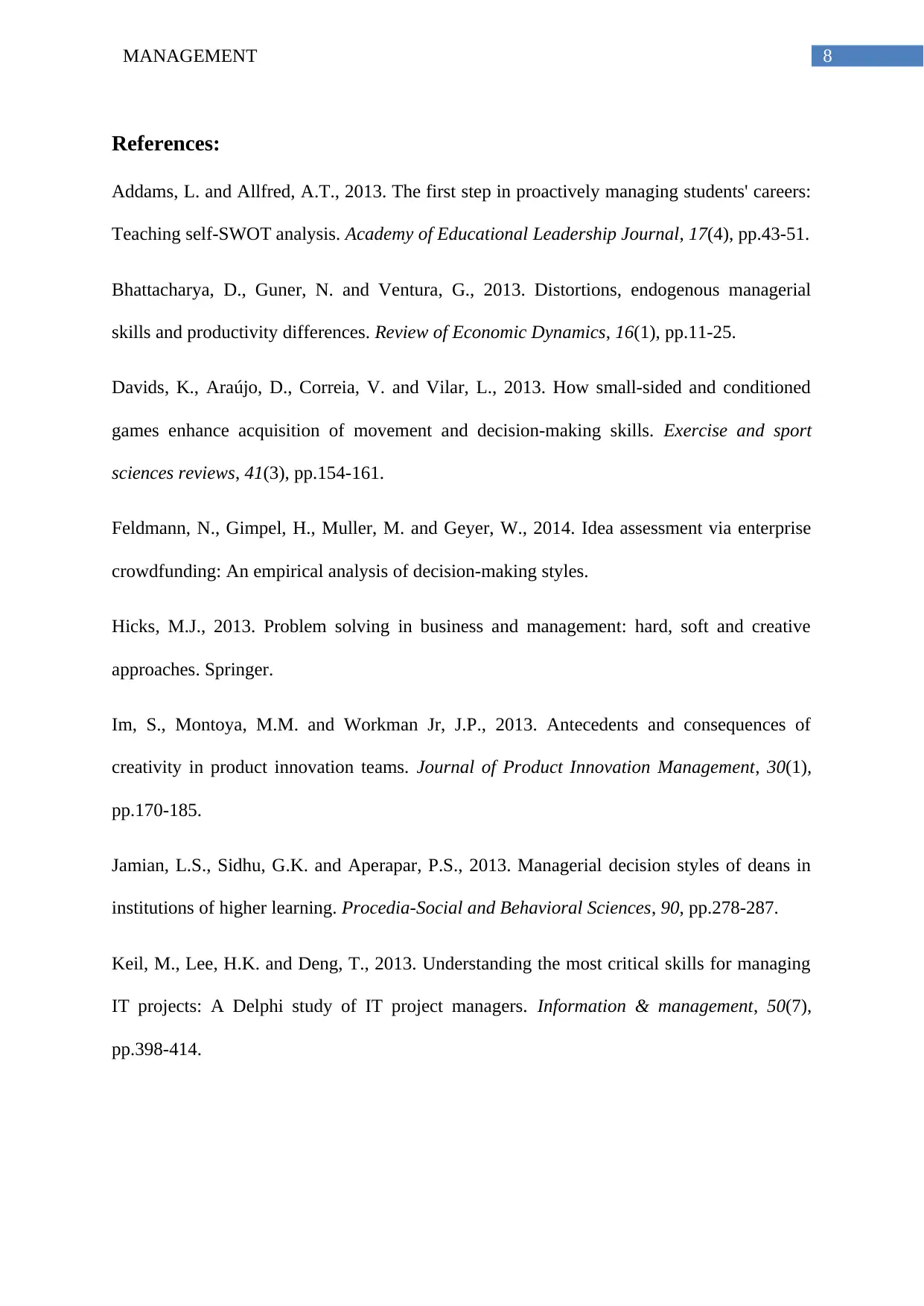
8MANAGEMENT
References:
Addams, L. and Allfred, A.T., 2013. The first step in proactively managing students' careers:
Teaching self-SWOT analysis. Academy of Educational Leadership Journal, 17(4), pp.43-51.
Bhattacharya, D., Guner, N. and Ventura, G., 2013. Distortions, endogenous managerial
skills and productivity differences. Review of Economic Dynamics, 16(1), pp.11-25.
Davids, K., Araújo, D., Correia, V. and Vilar, L., 2013. How small-sided and conditioned
games enhance acquisition of movement and decision-making skills. Exercise and sport
sciences reviews, 41(3), pp.154-161.
Feldmann, N., Gimpel, H., Muller, M. and Geyer, W., 2014. Idea assessment via enterprise
crowdfunding: An empirical analysis of decision-making styles.
Hicks, M.J., 2013. Problem solving in business and management: hard, soft and creative
approaches. Springer.
Im, S., Montoya, M.M. and Workman Jr, J.P., 2013. Antecedents and consequences of
creativity in product innovation teams. Journal of Product Innovation Management, 30(1),
pp.170-185.
Jamian, L.S., Sidhu, G.K. and Aperapar, P.S., 2013. Managerial decision styles of deans in
institutions of higher learning. Procedia-Social and Behavioral Sciences, 90, pp.278-287.
Keil, M., Lee, H.K. and Deng, T., 2013. Understanding the most critical skills for managing
IT projects: A Delphi study of IT project managers. Information & management, 50(7),
pp.398-414.
References:
Addams, L. and Allfred, A.T., 2013. The first step in proactively managing students' careers:
Teaching self-SWOT analysis. Academy of Educational Leadership Journal, 17(4), pp.43-51.
Bhattacharya, D., Guner, N. and Ventura, G., 2013. Distortions, endogenous managerial
skills and productivity differences. Review of Economic Dynamics, 16(1), pp.11-25.
Davids, K., Araújo, D., Correia, V. and Vilar, L., 2013. How small-sided and conditioned
games enhance acquisition of movement and decision-making skills. Exercise and sport
sciences reviews, 41(3), pp.154-161.
Feldmann, N., Gimpel, H., Muller, M. and Geyer, W., 2014. Idea assessment via enterprise
crowdfunding: An empirical analysis of decision-making styles.
Hicks, M.J., 2013. Problem solving in business and management: hard, soft and creative
approaches. Springer.
Im, S., Montoya, M.M. and Workman Jr, J.P., 2013. Antecedents and consequences of
creativity in product innovation teams. Journal of Product Innovation Management, 30(1),
pp.170-185.
Jamian, L.S., Sidhu, G.K. and Aperapar, P.S., 2013. Managerial decision styles of deans in
institutions of higher learning. Procedia-Social and Behavioral Sciences, 90, pp.278-287.
Keil, M., Lee, H.K. and Deng, T., 2013. Understanding the most critical skills for managing
IT projects: A Delphi study of IT project managers. Information & management, 50(7),
pp.398-414.
⊘ This is a preview!⊘
Do you want full access?
Subscribe today to unlock all pages.

Trusted by 1+ million students worldwide
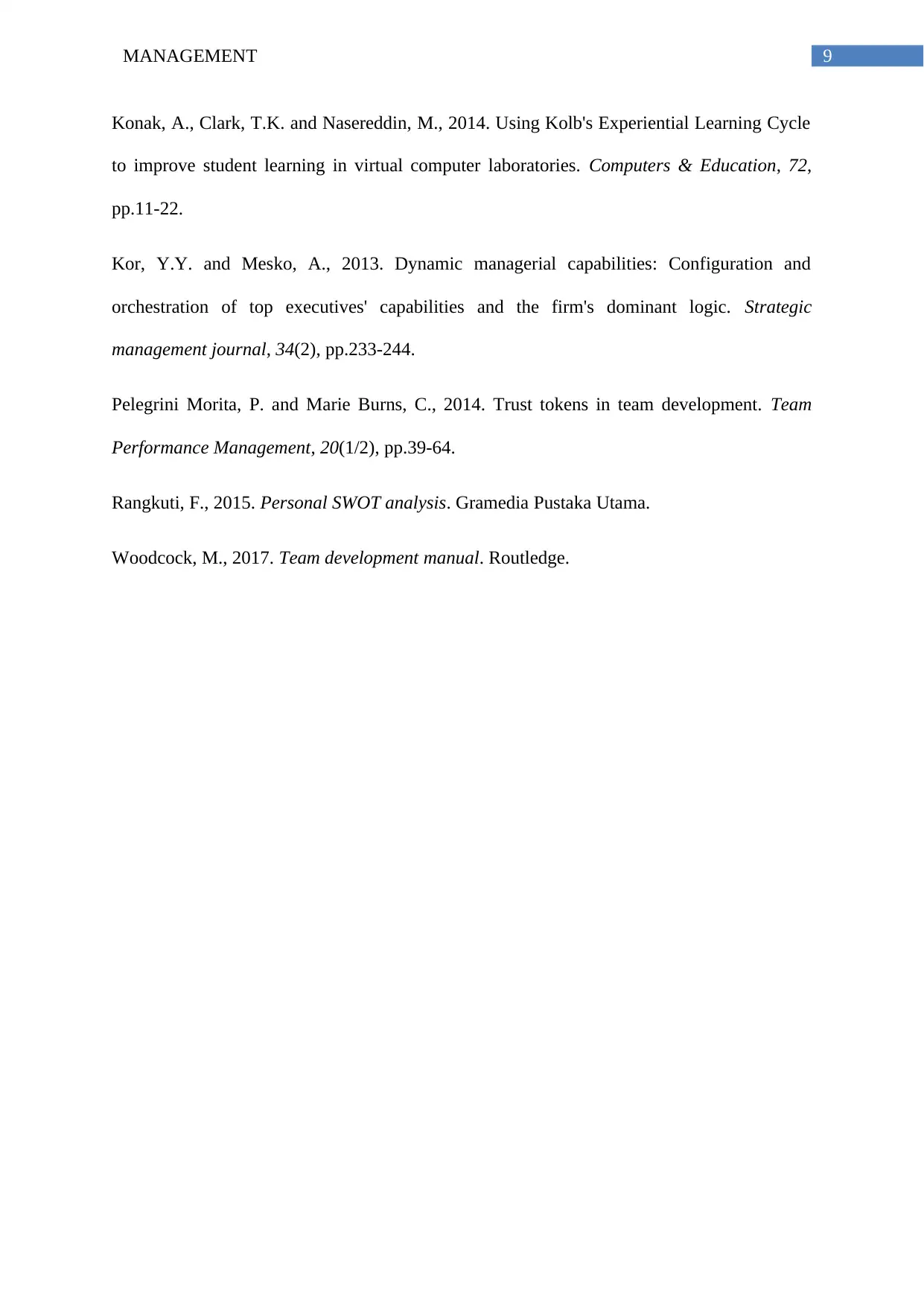
9MANAGEMENT
Konak, A., Clark, T.K. and Nasereddin, M., 2014. Using Kolb's Experiential Learning Cycle
to improve student learning in virtual computer laboratories. Computers & Education, 72,
pp.11-22.
Kor, Y.Y. and Mesko, A., 2013. Dynamic managerial capabilities: Configuration and
orchestration of top executives' capabilities and the firm's dominant logic. Strategic
management journal, 34(2), pp.233-244.
Pelegrini Morita, P. and Marie Burns, C., 2014. Trust tokens in team development. Team
Performance Management, 20(1/2), pp.39-64.
Rangkuti, F., 2015. Personal SWOT analysis. Gramedia Pustaka Utama.
Woodcock, M., 2017. Team development manual. Routledge.
Konak, A., Clark, T.K. and Nasereddin, M., 2014. Using Kolb's Experiential Learning Cycle
to improve student learning in virtual computer laboratories. Computers & Education, 72,
pp.11-22.
Kor, Y.Y. and Mesko, A., 2013. Dynamic managerial capabilities: Configuration and
orchestration of top executives' capabilities and the firm's dominant logic. Strategic
management journal, 34(2), pp.233-244.
Pelegrini Morita, P. and Marie Burns, C., 2014. Trust tokens in team development. Team
Performance Management, 20(1/2), pp.39-64.
Rangkuti, F., 2015. Personal SWOT analysis. Gramedia Pustaka Utama.
Woodcock, M., 2017. Team development manual. Routledge.
1 out of 10
Related Documents
Your All-in-One AI-Powered Toolkit for Academic Success.
+13062052269
info@desklib.com
Available 24*7 on WhatsApp / Email
![[object Object]](/_next/static/media/star-bottom.7253800d.svg)
Unlock your academic potential
Copyright © 2020–2026 A2Z Services. All Rights Reserved. Developed and managed by ZUCOL.





